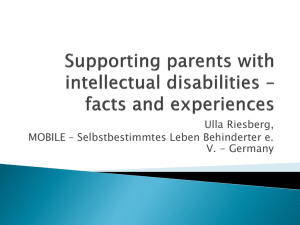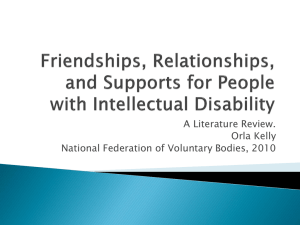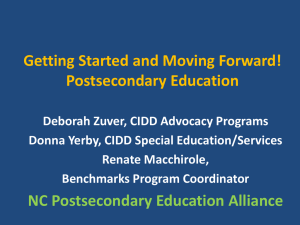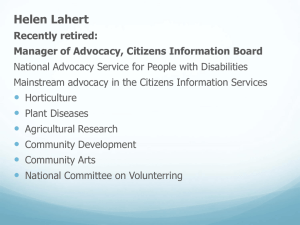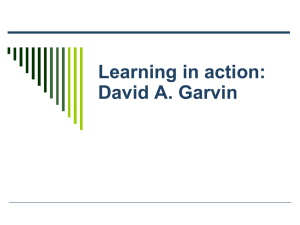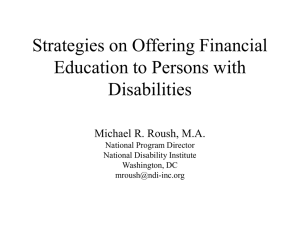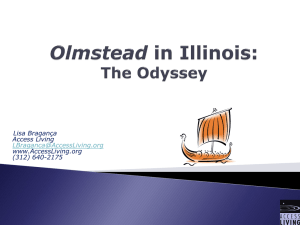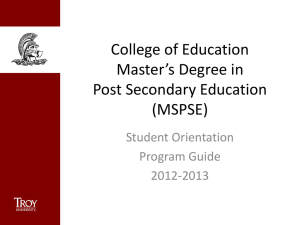Community Assessment Full Presentation
advertisement
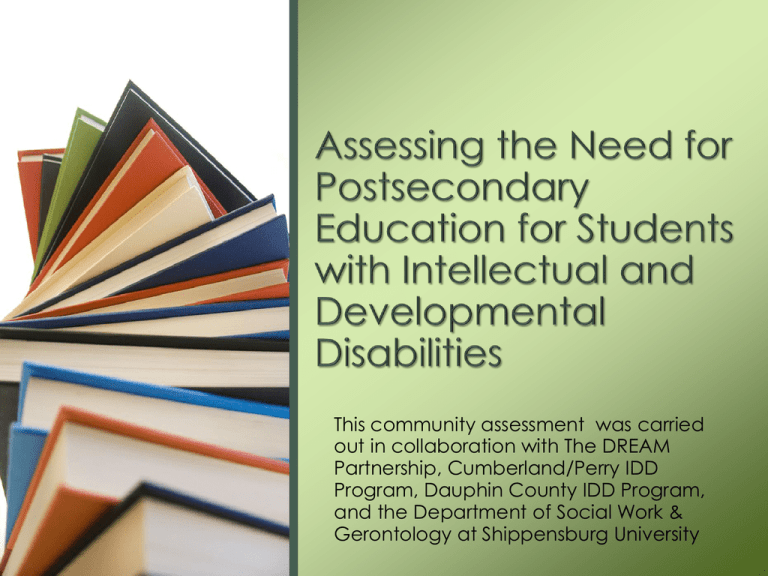
This community assessment was carried out in collaboration with The DREAM Partnership, Cumberland/Perry IDD Program, Dauphin County IDD Program, and the Department of Social Work & Gerontology at Shippensburg University Background • This needs assessment was conducted by Social Work students and faculty of Shippensburg University for the purpose of assisting the Cumberland/Perry and Dauphin County Intellectual and Developmental Disabilities Agencies and the D.R.E.A.M. Partnership Board of Directors in determining the interest level of area individuals with intellectual disabilities (IDD) and their families in postsecondary educational opportunities. • Postsecondary education (PSE) terminology D.R.E.A.M. Partnership • Dreams Realized through Educational Aspiration Model • Formed by parents and professionals • To provide postsecondary education (PSE) opportunities to students with IDD to increase competitive employment and promote independent living in Central Pennsylvania. • Intellectual and developmental disabilities (IDD) arise from physical, genetic, and social factors and affect 1-3% of Americans (Arc, 2013). • IDD is characterized by – sub-average intellectual functioning – limitations in adaptive functioning skills – onset prior to age 18 (Arc, 2013) • Research shows individuals with IDD who obtain postsecondary education (PSE) have greater opportunities for competitive employment (DREAM, 2012). Research Design Two Types of Data Collection Qualitative Research Quantitative Research Parent/Guardian Focus Groups Family Survey Student Focus Groups Interviews with Students Two Types of Data Collection Qualitative Research Parent/Guardian Focus Groups Student Focus Groups • 7 focus groups were held during the last week in February. • The script and questions were developed by Shippensburg Faculty, county offices of Cumberland/Perry IDD and Dauphin IDD, and the D.R.E.A.M. Partnership. • Informed consent and assent forms were signed by Parents, Guardians, Staff and Students. • The qualitative information gathered during the focus groups was recorded and transcribed. Participants Dauphin County Cumberland County • 209 flyers sent to individuals living in Dauphin County. • 174 flyers sent to individuals living in Cumberland and Perry Counties. An additional 630 flyers were sent to the 22 school districts in Cumberland, Dauphin and Perry Counties. • Those in attendance were split into two groups: potential postsecondary education students and parents/guardians/support staff.** Two Types of Data Collection • Results of the focus groups guided development of two questionnaires. • Self-administered surveys were mailed to households. • Student surveys were completed during face-to-face interviews. Questions evaluated barriers or challenges regarding: •college curriculum •independent living skills •socialization in commuter and residential college settings. Quantitative Research Family Survey Interviews with Students Family Participants Surveys were sent to all households that had an individual aged 14-21 registered with the Cumberland/Perry and Dauphin agencies. Dauphin County Cumberland County • 209 surveys sent to the households of individuals living in Dauphin County. • 174 surveys sent to the households of individuals living in Cumberland and Perry Counties. Of the 383 surveys mailed, approximately 15% (57) surveys were returned. Student Participants Dauphin County Cumberland County • The agency contacted individuals on their caseload between the ages of 16-21, that had previously expressed an interest in PSE in their Individual Support Plans or Prioritization of Urgency of Need for Services (PUNS). • A list of all individuals between the ages of 1621on the caseload was collected. • Five were scheduled from Dauphin County. • Random number generation was used to select names. • 39 individuals were contacted from the Cumberland/Perry list with five scheduled from Cumberland County. Survey Data • Both surveys used a Likert Scale with a rating of 1-5. • Analysis was done using Excel. • Research questions were then grouped by similar themes and analyzed to create charts and tables of data. Results Focus Groups of Parents/Guardians/Staff • “She [student] can do a lot on her own, but she would need to touch base with someone for reassurance and guidance.” • “I think now a lot of these dorms are co-ed and that would not work at all. For those kids with intellectual disabilities, that’s not good.” • “…our children are used to individualized education, so when you go to college, that’s not really individualized, you have to fit in.” • “…I don’t think he could succeed in going to a class that has 100 kids in it. You know he needs to go to a class that has five or six and that they aren’t gonna bother him…” Focus Groups of Students • “I had a student, she actually helped me with just getting my work done because it just wasn’t happening.” • “Your grades and the homework in college is hard.” • “First, trying to find your way around everything and second, is meeting people and teachers. You know their personalities and the social life.” • “…it was happening more than once a week and people I was in class with did not care to know me, did not care to want know me and they knew I was weak and knew I couldn’t defend myself as well as I probably could know they would take advantage of it.” Family Questionnaires • Of the 383 mailed, approximately 15% (57) questionnaires were returned. • 27 from Cumberland, 17 from Dauphin, 3 from Perry, 10 County not identified • 10 (17.5%) stated they or their children had no interest in PSE. • Of the remaining questionnaires, 57% of parents indicated that their child showed interest in going to college and that they were interested in PSE for their child. • Parents identified obtaining competitive employment as a primary goal for PSE. Object 1: Curriculum Focus for PSE 4.5 91% 4 73% 3.5 58% 3 47% 2.5 2 1.5 1 0.5 0 Vocational Skills Focused Academic Focused Academic (Personal Growth) Life Skills Note. Numbers represent answers based on Likert Scale (5-Strongly Agree, 4-Agree, 3-Unsure, 2-Disagree, 1-Strongly Disagree). There were no responses tallied 5 – Strongly Agree. Percentages based on responses of Strongly Agree/Agree. •Parents agreed that their students would need: – Additional support – An identified mentor and/or a specialized resident assistant Table 2: Supports Needed Question Average* Standard Deviation Strongly Agree/Agree Arriving to classes on time 3.93 1.08 78% Navigating the campus 3.93 0.98 78% Academic activities (i.e. homework) 4.36 0.8 91% *Average answers based on Likert Scale (5-Strongly Agree, 4-Agree, 3-Unsure, 2-Disagree, 1-Strongly Disagree) • Parents disagreed that their student could: – Make decisions about daily living without oversight – Be able to manage their medical situation – Structure out of class time safely Table 1: Daily Safety Question Make decisions about daily living without oversight Standard Average Deviation Strongly Agree/Agree 2.22 1.27 22% Manage their medical situation 2.31 1.34 24% Structure out-of-class time safely Child would benefit from safety awareness programs 2.33 1.18 20% 4.26 0.98 82% *Average answers based on Likert Scale (5-Strongly Agree, 4-Agree, 3-Unsure, 2-Disagree, 1-Strongly Disagree) Percentages based on answers of Strongly Agree/Agree Student Questionnaires • 7 face-to-face interviews with students with IDD. • 71% thought about going to college and are interested in college. • 86% agreed they would like help with their class work. • 100% agreed it would be easier for them with the help of another student. • 100% agreed that meeting their professors or teachers prior to starting class would be helpful. Table 3: Social Interests Question Standard Average Deviation Strongly Agree/Agree Excited to meet new people 4.57 0.53 100% Nervous to meet new people 2.85 1.77 43% 4 1.52 71% Interested in participating in sports 3.28 1.7 57% Working and attending school 4.42 0.78 86% Interested in joining a club *Average answers based on Likert Scale (5-Strongly Agree, 4-Agree, 3-Unsure, 2-Disagree, 1-Strongly Disagree) Percentages based on answers of Strongly Agree/Agree Table 4 Bullying and Safety Question Standard Average* Deviation Strongly Agree/Agree I think I would be safe at college 3.57 1.27 57% Thoughts of getting bullied at college 2.85 1.06 29% • 57% agreed they would like to live in the dorms and 83% identified they would like to have a roommate. • 100% agreed they thought college would help them find a better job and learn to live independently. • 57% of respondents agreed they could manage time, do their own laundry, and cook for themselves. • 29% agreed that they could meet homework deadlines on their own. • Few (14%) felt they could manage their money. Table 4: Everyday Abilities Average Standard Deviation I can manage my time 3.42 1.51 57% I can meet homework deadlines 2.85 1.06 29% I can manage my money 2.57 0.78 14% I can do my own laundry 3.74 1.11 57% I can cook for myself 3.42 1.13 57% Question Strongly Agree/Agree *Average answers based on Likert Scale (5-Strongly Agree, 4-Agree, 3-Unsure, 2-Disagree, 1-Strongly Disagree) Percentages based on answers of Strongly Agree/Agree Discussion and Recommendation Overview • Many families expressed little to no prior knowledge regarding PSE for individuals with IDD. • Over half of participants reported interest. • Students and parents differ on preference for commuting and oncampus living. • Students are not currently receiving preparation geared toward success in PSE. Identified Areas of Focus • Obtaining competitive employment • Preparation for PSE • Mentoring • Type of program • Integrated Support Model Competitive Employment • Work study/internship • Enrollment in classes that are relevant to job interests Preparation/Transition • Trepidation was expressed regarding the current level of preparation. • Address student and family concerns for safety, socialization, and program success. • Facilitate the transition from the structured environment of high school to the less structured college experience. Inclusive/Integrated Support Model • This model combines a genuine college experience with several key features. • Individualized College Plans (ICP) are created and modified based on student goals and needs with input from families, schools, and relevant helping agencies. Peer Mentoring • Peer mentoring should be a vital component providing benefits to the students and additional peace of mind for parents. – Navigating campus – Help with homework and daily activities – Introduction to clubs and sports – Familiarity with dining facilities – Time-management – Routine safety precautions – Issues with other students Commuter vs. Campus Living • Parents consistently showed concern and apprehension about dorm living. • Research indicates that programs with on campus dormitory components increase independence and social skills for students with IDD. • Transportation is a serious barrier to PSE. Research Strengths • Research included families and individuals across Dauphin, Cumberland, and Perry Counties. • Qualitative and quantitative data. • Direct interaction with students. • New communication between students and parents/guardians/staff about the opportunity for PSE. • Identified areas of focus provide opportunity. Limitations • Relatively low response rate. • Limits the generalizability of the findings. • Difference in the selection process of students and families in Dauphin and Cumberland/Perry Counties for the face-to-face interviews. • More time for response to focus group flyers may have increased participation; more faceto- face student questionnaires would have benefited the data collection. Conclusions • PSE enhances opportunities for competitive employment and personal growth. • Individuals and families require more information about the possibilities to make informed decisions. • Lack of supportive living and transportation are barriers. • On-going life skills, money management, and emotional support components are suggested to improve outcomes. References Arc, The. (2011). Introduction to intellectual disabilities. Retrieved from http://www.thearc.org/page.aspx?pid=2448 Arc, The. (2013). Intellectual disability. Retrieved from http://www.thearc.org/page.aspx?pid=2543 Carroll, S. Z., Blumberg, E. R., & Petroff, J. G. (2008). The promise of liberal learning: Creating a challenging postsecondary curriculum for youth with intellectual disabilities. Focus on Exceptional Children, 40(9), 1-12. D.R.E.A.M. Partnership. (2012). Dreams realized through educational aspiration model. Camp Hill, PA: D.R.E.A.M. Partnership. Folk, E. D. R., Yamamoto, K. K., & Stodden, R. A. (2012). Implementing inclusion and collaborative teaming in a model program of postsecondary education for young adults with intellectual disabilities. Journal of Policy and Practice in Intellectual Disabilities, 9(4), 257-269. Griffin, M. M., McMillan, E. D., & Hodapp, R. M. (2010). Family perspectives on post-secondary education for students with intellectual disabilities. Education and Training in Autism and Developmental Disabilities, 45(3), 339-346. Grigal, M., Hart, D., & Lewis, S. (2011). A prelude to progress: Postsecondary education and students with intellectual disabilities. Impact: Feature Issue on Postsecondary Education and Students with Intellectual, Developmental and Other Disabilities, 23(3). Retrieved from http://ici.umn.edu/products/impact/233. Grigal, M., Hart, D., & Migliore, A. (2011). Comparing the transition planning, postsecondary education, and employment outcomes of students with intellectual and other disabilities. Career Development for Exceptional Individuals, 34(1), 4-17. References continued Grigal, M., Hart, D., & Weir, C. (2012). A survey of postsecondary education programs for students with intellectual disabilities in the United States. Journal of Policy and Practice in Intellectual Disabilities, 9(4), 223-233. Hafner, D., Moffatt, C., & Kisa, N. (2011). Cutting-edge: Integrating students with intellectual and developmental disabilities into a 4-year liberal arts college. Career Development for Exceptional Individuals, 34(1), 18-30. doi: 10.1177/0885728811401018 Hurtubis Sahlen, C. A., & Lehmann, J. P. (2006). Requesting accommodations in higher education. Teaching Exceptional Children, 38(3), 28-34. Jones, M. M., & Goble, Z. (2012). Creating effective mentoring partnerships for students with intellectual disabilities on campus. Journal of Policy and Practice in Intellectual Disabilities, 9(4), 270-278. Kelley, K. R., & Westling, D. L. (2013). A focus on natural supports in postsecondary education for students with intellectual disabilities at Western Carolina University. Journal of Vocational Rehabilitation, 38(1), 67-76. doi: 10.3233/JVR-120621 Kleinert, H. L., Jones, M. M., Sheppard-Jones, K., Harp, B., & Harrison, E. M. (2012). Students with intellectual disabilities going to college? Absolutely! Teaching Exceptional Children, 44(5), 26-35. Martinez, D. C., Conroy, J. W., & Cerreto, M. C. (2012). Parent involvement in the transition process of children with intellectual disabilities: The influence of inclusion on parent desires and expectations for postsecondary education. Journal of Policy and Practice in Intellectual Disabilities, 9(4), 279-288. Mock, M., & Love, K. (2012). One state’s initiative to increase access to higher education with people with intellectual disabilities. Journal of Policy and Practice in Intellectual Disabilities, 9(4), 289-297. References continued Papay, C. K., & Bambara, L. M. (2011). Postsecondary education for transition-age students with intellectual and other developmental disabilities: A national survey. Education and Training in Autism and Developmental Disabilities, 46(1), 78-93. Random.org. (2013). True random number service. Retrieved from http://www.random.org/ Rubin, A., & Babbie, E. R. (2011). Research methods for social work, (7th ed.). Belmont, CA: Brooks/Cole: Cengage Learning. Shaw, S. F., Dukes, L. L., & Madaus, J. W. (2012). Beyond compliance. Teaching Exceptional Children, 44(5), 6-12. Think College. (2013). Retrieved from http://www.thinkcollege.net/ Thoma, C. A., Lakin, K. C., Carlson, D., Domzal, C., Austin, K., & Boyd, K. (2011). Participation in postsecondary education for students with intellectual disabilities: A review of the literature 2001-2010. Journal of Postsecondary Education and Disability, 24(3), 175-191. Uditsky, B., & Hughson, E. (2012). Inclusive postsecondary education – An evidence-based moral imperative. Journal of Policy and Practice in Intellectual Disabilities, 9(4), 298-302. VanBergeijk, E. O., & Cavanagh, P. K. (2012). Brief report: New legislation supports students with intellectual disabilities in post-secondary funding. Journal of Autism Developmental Disorders, 42(11), 2471-2475. doi: 10.1007/s10803-012-1481-4 Wilgosh, L., Scorgie, K., Sobsey, D., & Cey, R. (2010). Quality of life and empowerment for postsecondary students with physical and learning disabilities. Developmental Disabilities Bulletin, 38(1 & 2), 111-131. Question & Answers • For information, contact: – D.R.E.A.M Partnership, dreampartnership.org – Executive Director, Sherri Landis, 717.975.0611 – Cumberland/Perry Co. IDD, Sue Carbaugh, 717.240.6320 – Dauphin Co. IDD, Shirley Keith Knox, 717.780.7050 – Principal investigator of the project through Shippensburg University, Department of Social Work & Gerontology, djminnick@ship.edu
